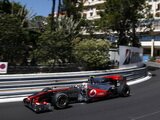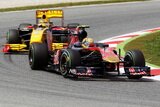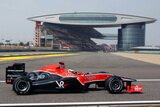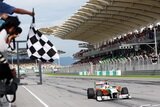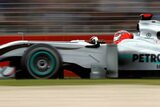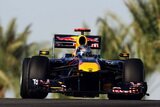Sergio Perez: I think it was a good day. I felt comfortable towards the end of the session. Tomorrow I need to improve a bit more. Apart from this I think it is a good first day and hopefully tomorrow can go the same way.
Q: This is your first grand prix, although I am sure you have been to Grands Prix before with GP2 et cetera, what is your first impression of it?
SP: It is very tough, it is very difficult to get the most out of it with the traffic, with the tyres, with all the things you have to be moving which I was not used to. In GP2 you do not have to move anything like this. It is very critical not to get everything right for just one lap but to be consistent as well, so it is quite a big step but overall I am comfortable.
Q: What’s the most different thing from GP2 for you?
SP: I would say the amount of things you do have. Not only inside of the car, out of the car you have also a lot of people around you. You have to be very focused to be right and don’t do any mistakes as it is very easy to do mistakes. You are very busy moving a lot of things on the steering wheel which I was not used to. You have to worry about the tyres, it is a big package. It is not only one thing, I think it is a bigger picture.
Q: Obviously a good time today.
SP: Yes, today was good day for me.
Q: Paul, you were also quicker than your team-mate as well. Your feelings about today?
PdiR: Again, it is quite difficult to come to your first grand prix. I obviously sat out FP1. Nico (Hulkenberg) was in the car and session two was quite tricky with the weather. Also the traffic, just trying to get some clear laps to give me a good idea going into tomorrow. I think it was quite positive. We ran through the programme we had to so we will certainly need to sit down and analyse it and try just to improve upon myself where I think most of the time will be.
Q: As you say, you sat out the morning session. That must have been quite difficult but on the other hand you had your morning session a year ago.
PdiR: Yeah, the morning session is a bit different. It gives you a bit more time. When you go out with all these guys and they are all up to speed a bit quicker, you obviously have to pace yourself a bit. But it is my first grand prix so I have to work from the bottom and try and work my way to the top. Every lap around Melbourne is key. You can quite easily make a mistake. I had to get through the programme going into tomorrow.
Q: How different for you is Formula One this year from last year?
PdiR: It is quite different. Thankfully I was able to go to all the grands prix last year and also take part in some of the testing in FP1 so it is not that new to me. But at the same time there is extra pressure, extra demands on you as a race driver. But you know what the case is when you take this job. I want to stay very focussed and put the effort in and keep a long-term relationship in Formula One and also with the team.
Q: A lot of people would say you were a touring car driver and now you are a single seater driver. That perhaps is over-extending it, but how different are the cars?
PdiR: They are quite different, there is no denying it. But Formula One has always been my dream to get here. It is the car I want to drive. You can’t really compare them. They are both at a different level. Equally I enjoyed racing DTM with Mercedes-Benz. I had four great years there. I think it has prepared me well but this step is also very big and only time will tell how the transition is. But relatively, up until now, I feel quite confident, quite comfortable. I need to put a lot of effort in and work up.
Q: Jerome, how was today for you. It seemed to be fairly simple but not necessarily, particularly quick at the moment?
JD’A: Well it was a good day for us. Obviously we need to work hard. It is not easy, but we made progress throughout the day and for us in this situation the most important thing in the end is to get better every time we hit the track. That was our case between the two sessions. I believe it will be the case also for tomorrow so this is the main thing really.
Q: This is your first full season of Formula One, but you have driven Formula One cars quite a lot haven’t you?
JD’A: About four morning sessions last year and then the Abu Dhabi rookie days. That was some experience. It was good for me to get up to speed in the winter testing. Last year I didn’t know the buttons and the steering wheel. It is quite complicated with Formula One. But then a race weekend is obviously very different. It is something new. Being quick over a test day is not the same thing. I have got many things to learn from Timo (Glock) so I am really lucky to have him beside me this year so I can learn a lot.
Q: You did the Renault demonstrations as well?
JD’A: Yes.
Q: Which must have been fun anyway?
JD’A: That was fun. That was donuts things. Now I know how to do donuts in a Formula One car, but hopefully I won’t have to use it in a grand prix weekend.
Q: How much of a worry is the 107 per cent rule as you were outside of that today?
JD’A: Well it is really nothing I should worry about as that is not going to be anything productive. The only thing I can do, and we all can do as a team, is to focus on getting the best out of what we have now. We will progress and we will get better but for now, for this weekend, we just have to focus on getting the best out of the package and that is the only thing which will bring us to a result that will hopefully be in the 107.
Q: Your aim for the season?
JD’A: It is difficult to give an aim in terms of results or points or things like that, quite concrete. There is a lot of data missing for that. I think for me I need to learn a lot from Timo and get as close to him as possible through the season. Get closer and closer and that’s the main things really.
Q: Sebastian, World Champion of course. How have things changed for you in 12 months.
Sebastian Vettel: Well in terms of how I approach the first race nothing has changed. It is Friday afternoon, it is a very busy day and I cannot be in the garage now, I have to be here so potentially it is the worst possible moment of the weekend to answer your question unless you can answer me which ratios we put in the car or those sorts of things. But as I said in terms of approach, how you come here, what you want to achieve, nothing has changed. Looking back it makes me very happy and very proud. I think that is the same for everyone in the team as well. We enjoy where we are at the moment, but we know as well we have zero points at this stage just like everybody else.
Q: Looking at the various changes in Formula One. First of all the tyres, how different are the two types of tyres after today’s sessions.
SV: Well they are different. I think it was good finally to come here and start the season and race on a different track. All winter we have been in Barcelona and I think we know it inside out and we know exactly what the tyres do. Today we were, I wouldn’t say surprised, but in a way probably surprised as the tyre behaviour is different. No doubt compared to last year the tyres are different. You cannot compare. There is a big difference. But I think we expected worse conditions here in terms of how long the tyres last et cetera. I think this morning and this afternoon was quite useful and helped us understand what to do in the race on Sunday. So far I think it is positive. Still we cannot race with one stop only. I think we have to come in a couple of times so ultimately we will find out on Sunday if the track improves or not as it is also something we have seen in the test. In four days running the track does not rubber in so we will see how it is here, different tarmac, different track, different lay-out, different conditions but so far we are positively surprised.
Q: What about the Drag Reduction System. It was very interesting watching you how much you use the DRS in one lap today.
SV: Well I think it is not just me it is all the others as well.
Q: No, I don’t think so. I think you used it more than anyone.
SV: Yeah, I don’t think the others need to wake up. We said it often enough that it works in a similar manner to the F-Duct and surely it keeps us busy. Melbourne is a rough track with a lot of bumps, lot of corners and you really feel the speed here in some corners and you don’t have much time between the corners. Everything is following up quickly so it keeps you busy. Similar to the F-Duct, you try to work on it as soon as you can to try to get the biggest benefit. I would be surprised if everyone else is much later operating it. I think that is partly what we have been talking about pre-season and not all of us yet probably do understand. As you can see and as you said it was the first time a lot of people got to see it. Qualifying and practice is very different to a race as in a race ideally you use it once a lap or maybe twice, but you know where and how so it is quite different to practice conditions.
Q: How do you balance using that with using KERS as well?
SV: Yes, you have to do that on top so there is no real balance. Either you do both...
Q: Have you got enough thumbs?
SV: It is up to us, the teams and drivers to find a lay-out that suits you. Nevertheless whatever part you use or if you use your thumb, another finger. Elbow hasn’t come in yet. But you need to find a way according to your liking. It depends or it varies between the drivers. Just practice and get used to it. But I think all of us, you are very busy, with both of those things plus driving. Now imagine the phone rings, then the next wall is very close.
Q: Nick, good to see you but in sad circumstances. I believe you have something on your helmet to acknowledge Robert?
Nick Heidfeld: Yes, I have his initials, RK, on the front of my helmet.
Q: It was obviously a late change for you to take over his seat. You were obviously working with Pirelli before then as a test driver; how much of an advantage was that?
NH: Well, I think one thing that could have been an advantage was that I helped in the early part of development on the construction, so at least that should have been something that suited me well. I wasn’t there when they developed the compounds and what I found out in testing was that I had no advantage at all in knowing how to set up the car, because you can imagine that when you develop a tyre you don’t try adjusting the set-up, you just put on new tyres, new tyres, new tyres all the time and we didn’t actually touch the set-up.
Q: So how did things go today?
NH: It was OK. It could have been better, could have been worse. We had some small issues on the car, didn’t do all the mileage we wanted but most importantly we learned quite a bit. You spoke about the tyres before with Sebastian; I also thought it was quite interesting. From testing in the winter we thought the soft tyres would only last one lap. I did my quickest lap here today on the second lap; the third lap wasn’t too bad either so this hopefully makes qualifying a bit less of a problem, because we will see more pit stops. And then on top of that, we see that the lap time difference between hard and soft tyres is quite big, huge - at least, compared to last year. That means that maybe only the very quick cars like the Red Bull may be able to use the hard tyres and save some soft tyres, but most other cars will already have to use soft tyres in Q1 to get through. That means that you only have two sets left for later on which you might also have to use in the race, so it makes things very different, quite interesting and complicated.
Q: And obviously if you get through to Q3, you’re probably going to be on soft tyres, you’ve got to start the race on soft tyres.
NH: Yes, definitely. It’s the same as last year. Of course they will last a bit longer but I don’t think that is the big issue; the big question is how many stops is it after that? On simulations, in winter testing in Barcelona, we’ve seen most cars and people doing three stops but you also saw that their lap times became quite slow towards the end of the stint. That was just to find out where the limit is. So it might be that in a real race situation you would have seen four stops. That, again, will be interesting to see. Today’s degradation was obviously a lot better but it should spice up the racing. It will be interesting to see how difficult it is to overtake during the race. It’s going to be new for everybody.
Q: And also there’s the possibility of better weather on Saturday, increased track temperatures as well. How much of a difference will that make?
NH: Nobody knows, because it wasn’t that hot in winter testing. Some people believe that with higher temperatures we will see the circuit improving and the rubber sticking to the surface for once. Now we just see marbles off-line, which might also make overtaking more difficult, but as Sebastian said, throughout winter testing the circuit was pretty much the same from day one to the end.
QUESTIONS FROM THE FLOOR
Q: (Frederic Ferret - L’Equipe) Nick how difficult was it to find your way back to Formula One in such a short time, and do you feel happy to be there, just as you were in other teams?
NH: Well, of course I’m extremely excited – as we’ve discussed – I’ve said many times that this is not the circumstances I wished for, with Robert’s really, really bad accident, but the team has made it very easy for me. They were very open right from the beginning and I only missed one test so I missed two days of driving. What I missed more was being with the team but the time that I’ve had up to now was enough to make up for that. I was probably a bit busier than the others in those early weeks but now I think I’ve caught up.
Q: (Joris Fioriti - AFP) Nick, we were normally used to seeing Robert in front of Vitaly in FP1, 2, 3, qualifying etc last year. Do you think it’s going to happen to you too? Do you have the same level as Robert? How do you see it?
NH: Well, I guess you asked the question because you saw that in P1 I was not in front of Vitaly but of course I will try to do my best, to do the best performance I can. I’m quite confident that I will be able to do that and will show some good performance.
Q: (Andreas Grobl - Osterreich) I have a question for Sebastian and Nick, maybe. Sebastian was talking about gear ratios before. Can you give us an idea as to how much the new drag reduction system influences gear ratios, in particular your highest gear? And if so, does that compromise you on straights where you’re not using the system?
SV: Basically, that’s the reason why we use it in qualifying and practice. Obviously, as I touched on earlier, it’s like the question why you have to operate it for all of the lap whereas you only have it available at one or two sections of the track in the race. So it would be useful to have the same regulations in qualifying and practice as in the race but that’s not the case. The reason why we’re allowed to use it at all in qualifying and practice is because otherwise we would probably select a different gear - top gear especially in the car - which then would not allow us to overtake because we would be sitting on the limiter as soon as we stalled the wing. So that is obviously the background, so to have the ability in practice and qualifying, to have similar ratios to in the race, working in the same range, so of course, that’s the first time we are now having to make this decision and it’s extremely important. Obviously the engineers can do a lot of work, but I think the driver is still very, very important and his input is as well. Practice just finished half an hour ago, that’s why, to be honest, I’m not so happy to be here now unless, as I said, you can give me an answer on our gear ratios.
Q: (Gert Vermersch - Het Nieuwsblad) Question to all drivers: the moveable wing was introduced to improve overtaking: did anyone of you use it to overtake somebody, and if yes, was it easier?
NH: Didn’t.
SV: Basically I tried, did not succeed. I tried but it was not enough to get past. In the end, that’s a good thing because you don’t want racing to be artificial, but to really answer this question I think we have to wait until Sunday when everyone is on similarly aged tyres and the same fuel load.
JD’A: I wasn’t really in a position to try, I guess.
PdiR: I think a lot of people have been using the DRS through most of their runs to try and get data on it. In testing, you can’t really get an idea when one car is not using it and one car is allowed to use it.
SP: I didn’t try it.
Q: (Thierry Wilmotte - Le Soir) Sebastian, you have a lot of rookies around you. Do you remember your first Grand Prix and do you have some advice to give to them?
SV: Of course I remember, it wasn’t that long ago. I raced with Paul, for instance, in Formula 3. I might have been in Formula One now for a couple of years but it wasn’t that long ago that my memory has suffered. Yeah, it’s always difficult to give advice because everyone at the end of the day has his own style and needs to find his own way. It was a little bit the same when I came in. Of course I wanted to drive as fast as the guys who were winning races but sometimes you have to accept that you’re probably not in the car to win races or finish on the podium, so really I think you need to find your own way and your own happiness, I guess. In the end, I did enjoy racing when I came into Formula One, my first race with BMW and then with Toro Rosso, even though I finished 17th or 12th in some races and obviously I do enjoy it now. I think that’s the most important thing.
Q: (Ian Parkes - The Press Association) Sebastian, you mentioned about Paul being your former teammate. He, of course, beat you that particular year…
SV: Thanks for mentioning it!
Q:…are you surprised that it’s taken him so long to get to Formula One? Obviously you went down very different routes after that season, and now that he’s here, what does it meant to have him here?
SV: I had the chance, obviously, to get to know him in ’06 and get used to his Scottish accent. Yes, so I understand him now! As I said, routes can be very different and in the end you have to find your own way, so I think it was quite exceptional the way he came into Formula One finally. I think he rightly deserves to be here. He’s quick enough, he’s proven that many times in DTM and before. I’m not again mentioning… you did it already. You know what happened in 2006 when I finished second. It’s good to have him here and I think we have a lot of young drivers now, but one day we might have old drivers again so if we all get old, we still want to be here and we don’t want new drivers to come in. I’m happy for every single one that has made the step because you know yourself just how hard it is. If you ask Nick the same question, he remembers very well. It never goes according to plan, even though from the outside it might always look easy for some of the people, I don’t think anyone had an easy route to get into Formula One. A lot of things have to turn your way.
Q: (Matthew Cochinos - Pitpass.com) Jérôme, the fact that you’re flirting with the 107 percent rule come qualifying tomorrow, has the comparative lack of performance in the car surprised you or caught the team unawares?
JD’A: Obviously we worked quite hard throughout the whole winter and we probably hoped for better progress but in the end, Formula One is tough, it’s a high level competition and we improved a lot compared to last year. Obviously you guys only see performance, but there are a lot of things that go around that like reliability and things like that. We did make progress – obviously we would like to be quicker but again, sometimes it doesn’t go exactly according to your plan and you’ve got to work hard to catch up and I’m sure we will do it, but we can only get better.
Q: (Luis Aguirre - Grupo Reforma, Mexico) Sergio, could you tell us a little bit about your first day in Formula One at a grand prix, and are you surprised to see you name in eighth position, and how real is this eighth position for you?
SP: I have to say it was really a good day for me because in the morning it wasn’t so good, because I didn’t know the circuit and I also had some traffic, but I have to say that the second practice was real, if I compare it to my teammate. It was a good session. I learned quite a lot about the tyres. Around here is quite different to what I was used to in testing. The conditions are really different. Normally you get your lap on lap one but now you can take more laps to set a time, so this is really something I experienced today. What really matters is tomorrow in qualifying and the race. We are trying to get the most out of it for tomorrow and try to do a good qualifying.
Comments:


